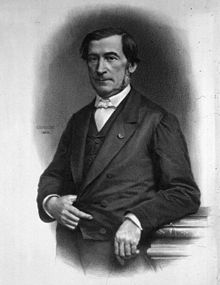Apollinaire Bouchardat
Apollinaire Bouchardat (born July 23, 1806 in L'Isle-sur-Serein , † April 7, 1886 in Paris ) was a French doctor , pharmacist and chemist . From 1856 he worked as a professor of hygiene in Paris and made a special contribution to the treatment of patients with diabetes mellitus .
So he introduced a special diet for diabetics and recognized the importance of physical activity and a reduction in body weight for those affected. The training of patients and self-monitoring of their metabolism as important principles of diabetes treatment are based on his ideas.
In addition, he suspected the origin of the disease in the pancreas and tried to prove this thesis through experimental studies. For these reasons he is considered one of the co-founders of diabetology .
Life
Apollinaire Bouchardat was born in L'Isle-sur-Serein in 1806 and worked in his uncle's pharmacy when he was young . At the age of 19 he went to Paris to there Pharmacy to study. To finance his studies, he taught himself and published an exam preparation book for other students. From 1829 he studied medicine , three years later he received his doctorate with a thesis on cholera . As early as 1833 he was proposed for a chair at the Paris Medical Faculty for the first time, but he worked from 1834 to 1855 initially as the head pharmacist of the Hôtel-Dieu de Paris hospital . From 1856 until his death he was professor of hygiene in Paris.
Apollinaire Bouchardat made many contributions to the treatment of diabetes patients at a time when neither the causes of the disease nor insulin were known as an effective therapy. On the basis of his own observations, he developed a special meat-containing form of nutrition for diabetics, which was called “Bouchardat's Diet” and was characterized by a high protein content and the most extensive replacement of carbohydrates with animal and vegetable fats . He also recognized the importance of reducing body weight and exercising in the treatment of diabetes mellitus. He also introduced a procedure for self- monitoring of patients through the detection of glucose in the urine , about which he wrote, among other things, that the daily monitoring of glucosuria would guide the patient "like a compass that guides a sailor on unknown oceans". He also stressed the importance of educating diabetics on how to manage their disease.
As early as the 19th century, Apollinaire Bouchardat established a series of principles - controlled nutrition, physical activity, metabolic control and patient education - which are central components of the therapy of diabetes mellitus up to the present day. He summarized his views on the treatment of diabetes in his work "De la glycosurie ou Diabète sucré son traitement hygiénique", first published in 1875. He assumed that the cause of the increased blood sugar level in diabetes mellitus was an increased uptake of glucose from food in the digestive tract , and he suspected the origin of the disease to be in the pancreas . He also tried to prove this theory on the basis of experimental studies involving the removal of the pancreas or the interruption of the passage of the pancreas in dogs .
In addition, Apollinaire Bouchardat worked as editor of the “Annuaire de thérapeutique, de matière médicale, de pharmacie et de toxicologie”, the “Archives de physiologie, de thérapeutique et d'hygiène” and the “Répertoire de pharmacie”. His most important work in the field of hygiene was the book "Traité d'hygiène publique et privée, basée sur l'étiologie", published in 1881, which was written in a generally understandable and sometimes humorous way and with a length of around 1100 pages, almost all of the known at the time Illustrated aspects of disease prevention . Politically, he represented during the reign of Napoléon III. democratic positions, in addition, he spoke out for the improvement of welfare and financial support for the poor sections of the population. In addition to medicine, he also devoted himself to agriculture and viticulture .
Apollinaire Bouchardat died in Paris in 1886. His son was the chemist and physician Gustave Bouchardat , who, among other things , succeeded in producing synthetic rubber in 1880 .
Works (selection)
- Elements of médicale et de pharmacie. Paris 1839
- Magistral New Form: [avec les Poids nouveaux et anciens en Regard]. Paris 1840 Digitized edition of the University and State Library Düsseldorf
- De la glycosurie ou Diabète sucré son traitement hygiénique. Paris 1875; Second edition 1883
- Traité d'hygiène publique et privée, basée sur l'étiologie. Paris 1881
literature
- Bouchardat, Apollinaire. In: Julius Pagel : Biographical lexicon of outstanding doctors of the nineteenth century. Urban & Schwarzenberg, Berlin and Vienna 1901, pp. 218/219
Web links
- Viktor Jörgens: Key Figures in the History of Diabetes: Apollinaire Bouchardat (1806-1886) . In: Diabetologia . 48 (1 )/2005. Title page and biography (English)
| personal data | |
|---|---|
| SURNAME | Bouchardat, Apollinaire |
| BRIEF DESCRIPTION | French doctor, pharmacist and chemist |
| DATE OF BIRTH | July 23, 1806 |
| PLACE OF BIRTH | L'Isle-sur-Serein |
| DATE OF DEATH | April 7, 1886 |
| Place of death | Paris |

